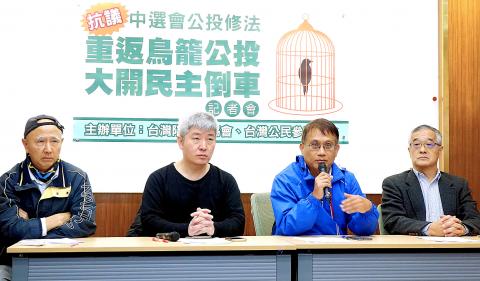A coalition of civil groups yesterday expressed concern that the Central Election Commission’s proposed changes to the Referendum Act (公民投票法) could restrict people’s rights and result in “a step backward for democracy.”
While they do agree with a number of changes the commission proposed last month, more could turn the law back to the “bird cage act” it once was, they told a Taipei news conference.
Before the legislature in December 2017 passed amendments to lower the legal voting age and the thresholds for initiating, seconding and passing referendums, the act was widely mocked as a “bird cage” act due to its tight restrictions.

Photo: Chu Pei-hsiung, Taipei Times
However, the amendments led to a number of execution difficulties during the Nov. 24 referendums, held on the same day as the nine-in-one elections, prompting the commission to consider more amendments.
The commission’s proposal to introduce more flexibility for determining referendum dates could lower the turnout rate for referendums, Animal Protection Administration Oversight Committee convener Wang Wei-chi (王唯治) said.
His group is “strongly opposed” to amending the law to allow holding referendums and elections on separate days whenever the commission considers that necessary, he said.
Wang is also opposed to the commission’s plan to require referendum initiators to collect hard copies of people’s identification cards in addition to signatures, saying it could make people less willing to support a proposal due to privacy concerns.
The public could also be less interested in participating in referendums if the commission limited a referendum question to 30 Chinese characters, he said.
“Many already find referendum questions difficult to understand. Adding a 30-character limit would make them even more difficult,” he said.
He agrees with the commission that a referendum proposal should undergo a longer wait period before the public can vote on it, but while the commission proposed holding the referendum three to six months after it is approved, he suggested holding it five to 12 months after the approval to allow more time for consideration and preparation.
Aletheia University associate professor of law Wu Ching-chin (吳景欽) said he is opposed to the commission’s plan to ban referendum questions on human rights, because it could grant the commission more power to sanction referendum topics.
“Human rights as a concept is very abstract and can take many different forms. In fact, almost all referendums held last year were related to human rights,” he said.
Banning anything related to human rights would be a step backward, he added.
To protect human rights, the government should enhance mechanisms for victims of unfair referendums to seek justice through the Council of Grand Justices, he said.
However, he agrees with the commission’s plan to ban campaigns on referendums on the day they are held, he said.
Under the current act, referendum campaigns can be held on the day of referendums as long as they are at least 30m away from polling stations, “but 30m is not that far and that could allow referendum initiators with more resources to influence the results,” he said.
In addition to the commission’s proposal, a number of Democratic Progressive Party legislators have put forward draft amendments to the act, Wang said, urging legislators to “watch out for traps” set by the commission to undercut progress in democracy.
Additional reporting by Ann Maxon

An essay competition jointly organized by a local writing society and a publisher affiliated with the Chinese Communist Party (CCP) might have contravened the Act Governing Relations Between the People of the Taiwan Area and the Mainland Area (臺灣地區與大陸地區人民關係條例), the Mainland Affairs Council (MAC) said on Thursday. “In this case, the partner organization is clearly an agency under the CCP’s Fujian Provincial Committee,” MAC Deputy Minister and spokesperson Liang Wen-chieh (梁文傑) said at a news briefing in Taipei. “It also involves bringing Taiwanese students to China with all-expenses-paid arrangements to attend award ceremonies and camps,” Liang said. Those two “characteristics” are typically sufficient

A magnitude 5.9 earthquake that struck about 33km off the coast of Hualien City was the "main shock" in a series of quakes in the area, with aftershocks expected over the next three days, the Central Weather Administration (CWA) said yesterday. Prior to the magnitude 5.9 quake shaking most of Taiwan at 6:53pm yesterday, six other earthquakes stronger than a magnitude of 4, starting with a magnitude 5.5 quake at 6:09pm, occurred in the area. CWA Seismological Center Director Wu Chien-fu (吳健富) confirmed that the quakes were all part of the same series and that the magnitude 5.5 temblor was

The brilliant blue waters, thick foliage and bucolic atmosphere on this seemingly idyllic archipelago deep in the Pacific Ocean belie the key role it now plays in a titanic geopolitical struggle. Palau is again on the front line as China, and the US and its allies prepare their forces in an intensifying contest for control over the Asia-Pacific region. The democratic nation of just 17,000 people hosts US-controlled airstrips and soon-to-be-completed radar installations that the US military describes as “critical” to monitoring vast swathes of water and airspace. It is also a key piece of the second island chain, a string of

The Central Weather Administration has issued a heat alert for southeastern Taiwan, warning of temperatures as high as 36°C today, while alerting some coastal areas of strong winds later in the day. Kaohsiung’s Neimen District (內門) and Pingtung County’s Neipu Township (內埔) are under an orange heat alert, which warns of temperatures as high as 36°C for three consecutive days, the CWA said, citing southwest winds. The heat would also extend to Tainan’s Nansi (楠西) and Yujing (玉井) districts, as well as Pingtung’s Gaoshu (高樹), Yanpu (鹽埔) and Majia (瑪家) townships, it said, forecasting highs of up to 36°C in those areas